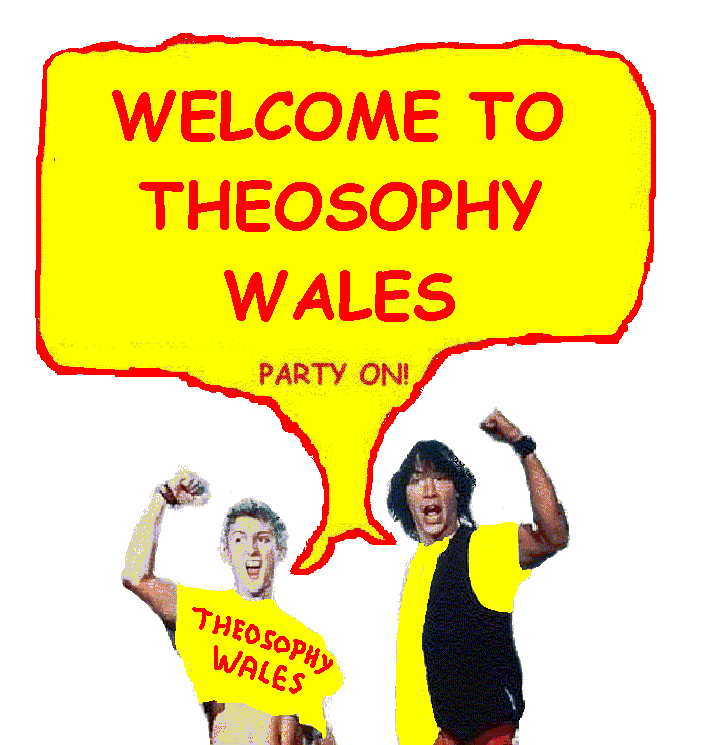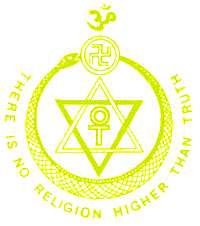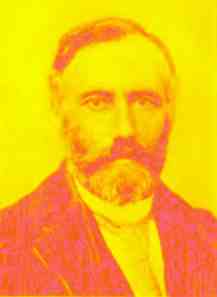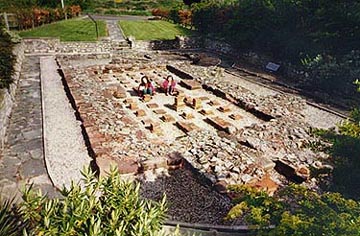

____________
THE
OF
THEOSOPHY

A Definitive Work on Theosophy
By
William Quan Judge

CHAPTER 1
Theosophy and
the Masters
Theosophy is that ocean of knowledge which spreads from shore to shore
of the evolution of sentient beings; unfathomable in its deepest parts, it
gives the greatest minds their fullest scope, yet, shallow enough at its
shores, it will not overwhelm the understanding of a child. It is wisdom about
God for those who believe that he is all things and in all, and wisdom about
nature for the man who accepts the statement found in the Christian Bible that
God cannot be measured or discovered, and that darkness is around his pavilion.
Although it contains by derivation the name God and thus may seem at first
sight toembrace religion alone, it does not neglect science, for it is the
science ofsciences and therefore has been called the wisdom religion. For no
science is complete which leaves out any department of nature, whether visible
or invisible, and that religion which, depending solely on an assumed
revelation, turns away from things and the laws which govern them is nothing
but a delusion, a foe to progress, an obstacle in the way of man's advancement
toward happiness. Embracing both the scientific and the religious, Theosophy is
a scientific religion and a religious science.
It is not a belief or dogma formulated or invented by man, but is a
knowledge of the laws which govern the evolution of the physical, astral,
psychical, and intellectual constituents of nature and of man. The religion of
the day is but a series of dogmas man-made and with no scientific foundation
for promulgated
ethics; while our science as yet ignores the unseen, and failing to
admit the existence of a complete set of inner faculties of perception in man,
it is cut off from the immense and real field of experience which lies within
the visible and tangible worlds.
But Theosophy knows that the whole is constituted of the
visible and the invisible, and perceiving outer things and objects to be
but transitory it grasps the facts of nature, both without and within. It is
therefore complete in itself and sees no unsolvable mystery anywhere; it throws
the word coincidence out of its vocabulary and hails the reign of law in
everything and every circumstance.
That man possesses an immortal soul is the common belief of humanity; to
this Theosophy adds that he is a soul; and further that all nature is sentient,
that the vast array of objects and men are not mere collections of atoms
fortuitously thrown together and thus without law evolving law, but down to the
smallest atom all is soul and spirit ever evolving under the rule of law which
is inherent in the whole. And just as the ancients taught, so does Theosophy;
that the course of evolution is the drama of the soul and that nature exists
for no other purpose than the soul's experience. The Theosophist agrees with
Prof. Huxley in the assertion that there must be beings in the universe whose
intelligence is as much beyond ours as ours exceeds that of the black beetle,
and who take an active part in the government of the natural order of things.
Pushing further on by the light of the confidence had in his teachers, the
Theosophist adds that such intelligences were once human and came like all of
us from other and previous worlds, where as varied experience had been gained
as is possible on this one.
We are therefore not appearing for the first time when we come upon this
planet, but have pursued a long, an immeasurable course of activity and
intelligent perception on other systems of globes, some of which were destroyed
ages before the solar system condensed. This immense reach of the evolutionary
system means, then, that this planet on which we now are is the result
of the activity and the evolution of some other one that died long ago, leaving
its energy to be used in the bringing into existence of the earth, and that the
inhabitants of the latter in their turn came from some older world to proceed
here with the destined work in matter. And the brighter planets, such as Venus,
are the habitation of still more progressed entities, once as low as ourselves,
but now raised up to a pitch of glory incomprehensible for our intellects.
The most intelligent being in the universe, man, has never, then, been
without a friend, but has a line of elder brothers who continually watch over
the progress of the less progressed, preserve the knowledge gained through
aeons of trial and
experience, and continually seek for opportunities of drawing the
developing intelligence of the race on this or other globes to consider the
great truths concerning the destiny of the soul. These elder brothers also keep
theknowledge they have gained of the laws of nature in all departments, and are
ready when cyclic law permits to use it for the benefit of mankind.
They have always existed as a body, all knowing each other, no matter in
what part of the world they may be, and all working for the race in many
different ways. In some periods they are well known to the people and move
among ordinary men whenever the social organization, the virtue, and the
development of the nations permit it. For if they were to come out openly and
be heard of everywhere, they would be worshipped as gods by some and hunted as
devils by others. In those periods when they do come out some of their number
are rulers of men, some teachers, a few great philosophers, while others remain
still unknown except to the most advanced of the body.
It would be subversive of the ends they have in view were they to make
themselves public in the present civilization, which is based almost wholly on
money, fame, glory, and personality. For this age, as one of them has already
said, "is an age of transition," when every system of thought,
science, religion, government, and society is changing, and men's minds are
only preparing for an alteration into that state which will permit the race to
advance to the point suitable for these elder brothers to introduce their
actual presence to our sight. They may be truly called the bearers of the torch
of truth across the ages; they investigate all things and beings; they know
what man is in his innermost nature and what his powers and destiny, his state
before birth and the states into which he goes after the death of his body;
they have stood by the cradle of nations and seen the vast achievements of the
ancients, watched sadly the decay of those who had no power to resist the
cyclic law of rise and fall; and while cataclysms seemed to show a universal
destruction of art, architecture, religion, and philosophy, they have preserved
the records of it all in places secure from the ravages of either men or time;
they have made minute observations, through trained psychics among their own
order, into the unseen realms of nature and of mind, recorded the observations
and preserved the record; they have mastered the mysteries of sound and color
through which alone the elemental beings behind the veil of matter can be
communicated with, and thus can tell why the rain falls and what it falls for,
whether the earth is hollow or not, what makes the wind to blow and light to
shine, and greater feat than all -- one which implies a knowledge of the very
foundations of nature -- they know what the ultimate divisions of time are and
what are the meaning and the times of the cycles.
But, asks the busy man of the nineteenth century who reads the
newspapers and believes in "modern progress," if these elder brothers
are all you claim them to be, why have they left no mark on history nor
gathered men around them? Their
own reply, published some time ago by Mr. A. P. Sinnett, is better than
any I could write.
"We will first discuss, if you please, the one relating to the
presumed failure of the 'Fraternity' to leave any mark upon the history of the
world. They ought, you think, to have been able, with their extraordinary
advantages, to have gathered into their schools a considerable portion of the
more enlightened minds
of every race. How do you know they have made no such mark? Are you
acquainted with their efforts, successes, and failures? Have you any dock upon
which to arraign them? How could your world collect proofs of the doings of men
who have sedulously kept closed every possible door of approach by which the
inquisitive could spy upon them? The precise condition of their success was
that they should never be surprised or obstructed. What they have done they
know; all that those outside their circle could perceive was the results, the
causes of which were masked from view.
To account for these results, many have in different ages invented
theories of the interposition of gods, special providences, fates, the benign
or hostile influences of the stars. There never was a time within or before the
so-called historical period when our predecessors were not moulding events and
'making history,' the facts of which were subsequently and invariably distorted
by historians to suit contemporary prejudices. Are you quite sure that the
visible heroic figures in the successive dramas were not often but their
puppets? We never pretended to be able to draw nations in the mass to this or
that crisis in spite of the general drift of the world's cosmic relations.
The cycles must run their rounds. Periods of mental and moral light and
darkness succeed each other as day does night. The major and minor yugas must
be accomplished according to the established order of things. And we, borne
along the mighty tide, can only modify and direct some of its minor
currents."
It is under cyclic law, during a dark period in the history of mind,
that the true philosophy disappears for a time, but the same law causes it to
reappear as surely as the sun rises and the human mind is present to see it.
But some works can only be performed by the Master, while other works
require the assistance of the companions. It is the Master's work to preserve
the true philosophy, but the help of the companions is needed to rediscover and
promulgate it. Once more the elder brothers have indicated where the truth --
Theosophy -- could be found, and the companions all over the world are engaged
in bringing it forth for wider currency and propagation.
The Elder Brothers of Humanity are men who were perfected in former
periods of evolution. These periods of manifestation are unknown to modern
evolutionists so far as their number are concerned, though long ago understood
by not only the older Hindus, but also by those great minds and men who
instituted and carried on the first pure and undebased form of the Mysteries of
Greece. The periods, when out of the Great Unknown there come forth the visible
universes, are eternal in their coming and going, alternating with equal
periods of silence and rest again in the Unknown. The object of these mighty
waves is the production of perfect man, the evolution of soul, and they always
witness the increase of the number of Elder Brothers; the life of the least of
men pictures them in day and night, waking and sleeping, birth and death,
"for these two, light and dark, day and night, are the world's eternal
ways."
In every age and complete national history these men of power and
compassion are given different designations. They have been called Initiates,
Adepts, Magi, Hierophants, Kings of the East, Wise Men, Brothers, and what not.
But in the Sanskrit language there is a word which, being applied to them, at
once thoroughly identifies them with humanity. It is Mahatma. This is composed
of Maha great, and Atma soul; so it means great soul, and as all men are souls
the distinction of the Mahatma lies in greatness.
The term Mahatma has come into wide use through the Theosophical
Society, as Mme. H. P. Blavatsky constantly
referred to them as her Masters who gave her the knowledge she
possessed.
They were at first known only as the Brothers, but afterwards, when many
Hindus flocked to the Theosophical movement, the name Mahatma was brought into
use, inasmuch as it has behind it an immense body of Indian tradition and
literature.
At different times unscrupulous enemies of the Theosophical Society have
said that even this name had been invented and that such beings are not known
of among the Indians or in their literature. But these assertions are made only
to discredit if possible a philosophical movement that threatens to completely
upset prevailing erroneous theological dogmas. For all through Hindu
literature Mahatmas are often spoken of, and in parts of the north of that
country the term is common. In the very old poem the Bhagavad-Gita, revered by
all Hindu sects and admitted by the western critics to be noble as well as
beautiful, there is a verse reading, "Such a Mahatma is difficult to
find."
But irrespective of all disputes as to specific names, there is
sufficient argument and proof to show that a body of men having the
wonderfulknowledge described above has always existed and probably exists
today. The older mysteries continually refer to them. Ancient Egypt had them in
her great king-Initiates, sons of the sun and friends of great gods. There is a
habit of belittling the ideas of the ancients which is in itself belittling to
the people of today. Even the Christian who reverently speaks of Abraham as
"the friend of God," will scornfully laugh at the idea of the claims
of Egyptian rulers to the same friendship being other than childish assumption
of dignity and title. But the truth is, these great Egyptians were Initiates,
members of the one great lodge which includes all others of whatever degree or
operation. The later and declining Egyptians, of course, must have imitated
their predecessors, but that was when the true doctrine was beginning once more
to be obscured upon the rise
of dogma and priesthood.
The story of Apollonius of Tyana is about a member of one of the same
ancient orders appearing among men at a descending cycle, and only for the
purpose of keeping a witness upon the scene for future generations.
Abraham and Moses of the Jews are two other Initiates, Adepts who had
their work to do with a certain people; and in the history of Abraham we meet
with Melchizedek, who was so much beyond Abraham that he had the right to
confer upon the latter a dignity, a privilege, or a blessing. The same chapter
of human
history which contains the names of Moses and Abraham is illuminated
also by that of Solomon. And thus these three make a great Triad of Adepts, the
record of whose deeds can not be brushed aside as folly and devoid of basis.
Moses was educated by the Egyptians and in Midian, from both of which he
gained much occult knowledge, and any clear-seeing student of the great
Universal Masonry can perceive all through his books the hand, the plan, and
the work of a master. Abraham again knew all the arts and much of the power in
psychical realms that were cultivated in his day, or else he could not have
consorted with kings nor have been "the friend of God"; and the
reference to his conversations with the Almighty in respect to the destruction
of cities alone shows him to have been an Adept who had long ago passed beyond
the need of ceremonial or other adventitious aids. Solomon completes this triad
and stands out in characters of fire. Around him is clustered such a mass of
legend and story about his dealings with the elemental powers and of his magic
possessions that one must condemn the whole ancient world as a collection of
fools who made lies for amusement if a denial is made of his being a great
character, a wonderful example of the incarnation among men of a powerful
Adept. We do not have to accept the name Solomon nor the pretence that he
reigned over the Jews, but we must admit the fact that somewhere in the misty
time to which the Jewish records refer there lived and moved among the people
of the earth one who was an Adept and given that name afterwards. Peripatetic
and microscopic critics may affect to see in the prevalence of universal
tradition naught but evidence of the gullibility of men and their power to
imitate, but the true student of human nature and life knows that the universal
tradition is true and arises from the facts in the history of man.
Turning to India, so long forgotten and ignored by the lusty and
egotistical, the fighting and the trading West, we find her full of the lore
relating to these wonderful men of whom Noah, Abraham, Moses, and Solomon are
only examples.
There the people are fitted by temperament and climate to be the
preservers of the philosophical, ethical, and psychical jewels that would have
been forever lost to us had they been left to the ravages of such Goths and
Vandals as western nations were in the early days of their struggle for
education and civilization. If the men who wantonly burned up vast masses of
historical and
ethnological treasures found by the minions of the Catholic rulers of
Spain, in Central and South America, could have known of and put their hands
upon the books and palm-leaf records of India before the protecting shield of
England was raised against them, they would have destroyed them all as they did
for the Americans, and as their predecessors attempted to do for the
Alexandrian library. Fortunately events worked otherwise.
All along the stream of Indian literature we can find the names by
scores of great adepts who were well known to the people and who all taught the
same story -- the great epic of the human soul. Their names are unfamiliar to
western ears, but the records of their thoughts, their work and powers remain.
Still more, in
the quiet unmoveable East there are today by the hundred persons who
know of their own knowledge that the Great Lodge still exists and has its
Mahatmas, Adepts, Initiates, Brothers.
And yet further, in that land are such a number of experts in the
practical application of minor though still very astonishing
power over nature and her forces, that we have an irresistible mass of
human evidence to prove the proposition laid down.
And if Theosophy -- the teaching of this Great Lodge -- is as said, both
scientific and religious, then from the ethical side we have still more proof.
A mighty Triad acting on and through ethics is that composed of Buddha,
Confucius, and Jesus. The first, a Hindu, founds a religion which today
embraces many more people than Christianity, teaching centuries before Jesus
the ethics which he taught and which had been given out even centuries before
Buddha. Jesus coming to reform his people repeats these ancient ethics, and
Confucius does the same thing for ancient and honorable China.
The Theosophist says that all these great names represent members of the
one single brotherhood, who all have a single doctrine. And the extraordinary
characters who now and again appear in western civilization, such as St.
Germain, Jacob Boehme, Cagliostro, Paracelsus, Mesmer, Count St. Martin, and
Madame H. P. Blavatsky, are agents for the doing of the work of the Great Lodge
at the proper time. It is true they are generally reviled and classed as
impostors -- though no one can find out why they are when they generally confer
benefits and lay down propositions or make discoveries of great value to
science after they have died. But Jesus himself would be called an impostor
today if he appeared in some Fifth avenue theatrical church rebuking the
professed Christians. Paracelsus was the originator of valuable methods and
treatments in medicine now universally used. Mesmer taught hypnotism under
another name. Madame Blavatsky brought once more to the attention of the West
the most important system, long known to the Lodge, respecting man, his nature
and destiny. But all are alike called impostors by a people who have no
original philosophy of their own and whose mendicant and criminal classes
exceed in misery and in number those of any civilization on the earth.
It will not be unusual for nearly all occidental readers to wonder how
men could possibly know so much and have such power over the operations of
natural law as I have ascribed to the Initiates, now so commonly spoken of as
the Mahatmas. In India, China, and other Oriental lands no wonder would arise
on these heads, because there, although everything of a material civilization
is just now in a backward state, they have never lost a belief in the inner
nature of man and in the power he may exercise if he will. Consequently living examples
of such powers and capacities have not been absent from those people. But in
the West a materialistic civilization having arisen through a denial of the
soul life and nature consequent upon a reaction from illogical dogmatism, there
has not been any investigation of these subjects and, until lately, the general
public has
not believed in the possibility of anyone save a supposed God having
such power.
A Mahatma endowed with power over space, time, mind, and matter, is a
possibility just because he is a perfected man. Every human being has the germ
of all the powers attributed to these great Initiates, the difference lying
solely in the fact that we have in general not developed what we possess the
germ of, while the Mahatma has gone through the training and experience which
have caused all the unseen human powers to develop in him, and conferred
gifts that look god-like to his struggling brother below.
Telepathy, mind-reading, and hypnotism, all long ago known to Theosophy,
show the existence in the human subject of planes of consciousness, functions,
and faculties hitherto undreamed
of. Mind-reading and the influencing of the mind of the hypnotized
subject at a distance prove the existence of a mind which is not wholly
dependent upon a brain, and that a medium exists through which the influencing
thought may be sent. It is under this law that the Initiates can communicate
with each other at no matter what distance. Its rationale, not yet admitted by
the schools of the hypnotizers, is, that if the two minds vibrate or change
into the same state they will think alike, or, in other words, the one who is
to hear at a distance receives the impression sent by the other. In the same
way with all other powers, no matter how extraordinary. They are all natural,
although nowunusual, just as great musical ability is natural though not usual
or common.
If an Initiate can make a solid object move without contact, it is
because he understands the two laws of attraction and repulsion of which
"gravitation" is but the name for one; if he is able to precipitate
out of the viewless air the carbon which we know is in it, forming the carbon
into sentences upon the paper, it is through his knowledge of the occult higher
chemistry, and the use of a trained and powerful image making faculty which
every man possesses; if he reads your thoughts with ease, that results from the
use of the inner and only real powers of sight, which require no retina to see
the fine-pictured web which the
vibrating brain of man weaves about him. All that the Mahatma may do is
natural to the perfected man; but if those powers are not at once revealed to
us it is because the race is as yet selfish altogether and still living for the
present and the transitory.
I repeat then, that though the true doctrine disappears for a time from
among men it is bound to reappear, because first, it is impacted in the
imperishable center of man's nature; and secondly, the Lodge forever preserves
it, not only in actual objective records, but also in the intelligent and fully
self-conscious men who, having successfully overpassed the many periods of
evolution which preceded the one we are now involved in, cannot lose the
precious possessions they have acquired. And because the elder brothers are the
highest product of evolution through whom alone, in co-operation with the whole
human family, the further regular and workmanlike prosecution of the plans of
the Great Architect of the Universe could be carried on, I have thought it well
to advert to them and their Universal Lodge before going to other parts of the
subject.
______________________
THE
OF
THEOSOPHY

Find out more about
Theosophy with these links

The Cardiff Theosophical Society Website
The National
Wales Theosophy Website
Theosophy
Wales Youtube Channel
Ten Benefits of Studying the Blavatskyan
Theosophical Teachings
Studying
the Blavatskyan Theosophical teachings offers numerous benefits that can greatly
enrich one's understanding of spirituality, philosophy, and the nature of
reality.† Theosophy, as defined by the
writings of Helena Petrovna Blavatsky, has had a profound impact on the
spiritual and philosophical landscape of the modern world. Blavatsky's
teachings draw from a wide range of religious and philosophical traditions,
including Hinduism, Buddhism, and Western esotericism, and present a
comprehensive worldview that addresses fundamental questions about existence,
consciousness, and the cosmos.
Here
are ten benefits of studying the Blavatskyan Theosophical Teachings
1.
Exploration of Esoteric Wisdom
One
of the primary benefits of studying the Blavatskyan Theosophical teachings is
the opportunity to explore esoteric wisdom that is often not readily accessible
in mainstream religious or philosophical traditions. Blavatsky's writings delve
into the esoteric teachings of ancient cultures and mystery schools, shedding
light on profound spiritual truths that have been passed down through the ages.
By delving into these esoteric teachings, students of Theosophy can gain
insights into the nature of consciousness, the structure of the cosmos, and the
evolution of the soul or immortal self.
2.
Synthesis of Eastern and Western Philosophy
Blavatsky's
Theosophical teachings synthesize elements of Eastern and Western philosophy,
offering a comprehensive framework that integrates concepts from diverse
cultural and religious traditions. This synthesis provides students with a
broader perspective on philosophical and spiritual thought, allowing them to
see the underlying unity of seemingly disparate belief systems. By studying
Theosophy, individuals can gain a deeper appreciation for the universal
principles that underlie all wisdom traditions, fostering a sense of unity and
interconnectedness with the world's spiritual heritage.
3.
Understanding of Universal Brotherhood
Central
to Blavatsky's Theosophical teachings is the principle of universal
brotherhood, which emphasizes the essential unity of all beings and the
interconnectedness of life. By studying Theosophy, individuals can develop a
profound understanding of the interconnected nature of existence, recognizing
that all living beings are fundamentally linked and that compassion and empathy
are essential for the evolution of humanity. This understanding can lead to a
greater sense of empathy, kindness, and social responsibility, fostering a more
harmonious and compassionate society.
4.
Insight into the Nature of Reality
The
Blavatskyan Theosophical teachings offer profound insights into the nature of
reality, consciousness, and the unseen dimensions of existence. Through the
study of Theosophy, individuals can explore concepts such as the
multi-dimensional nature of the universe, the existence of subtle energy
realms, and the interconnectedness of the material and spiritual planes. This
exploration can lead to a deeper understanding of the nature of reality beyond
the limitations of the physical senses, opening up new vistas of perception and
understanding.
5.
Personal Spiritual Growth
Studying
the Theosophical teachings can be a transformative journey that facilitates
personal spiritual growth and self-discovery. Blavatsky's writings offer
practical guidance for inner development, including meditation practices,
ethical principles, and the cultivation of spiritual virtues. By applying these
teachings to their lives, individuals can experience profound personal
transformation, leading to greater self-awareness, inner peace, and a sense of
purpose and meaning.
6.
Ethical and Moral Guidance
The
Theosophical teachings provide a comprehensive ethical and moral framework that
can guide individuals in their personal and social interactions. Blavatsky
emphasizes the importance of ethical conduct, altruism, and the pursuit of
wisdom, offering practical guidance for leading a virtuous and meaningful life.
By studying Theosophy, individuals can gain clarity on moral issues, cultivate
a sense of ethical responsibility, and contribute to the greater good of
humanity.
7.
Appreciation of Comparative Religion
The
study of Theosophy encourages an appreciation of comparative religion and the
underlying unity of religious and spiritual traditions. Blavatsky's writings
explore the common threads that run through the world's religions, highlighting
universal spiritual principles that transcend cultural and historical
boundaries. By gaining a deeper understanding of comparative religion through
Theosophy, individuals can develop a more inclusive and pluralistic
perspective, fostering interfaith harmony and mutual respect.
8.
Intellectual Stimulation
The
Theosophical teachings offer a rich and intellectually stimulating framework
for exploring profound philosophical and metaphysical concepts. Blavatsky's
writings encompass a wide range of subjects, including cosmology, metaphysics,
ancient wisdom, and the evolution of consciousness, providing ample material
for intellectual inquiry and contemplation. By engaging with these teachings,
individuals can expand their intellectual horizons, develop critical thinking
skills, and gain a deeper understanding of the fundamental questions that have
intrigued philosophers and mystics throughout history.
9.
Healing and Reconciliation
The
Theosophical teachings offer insights into the nature of healing and
reconciliation, both on a personal and collective level. Blavatsky's writings
delve into the esoteric principles of healing, the nature of disease, and the
interconnectedness of mind, body, and spirit. By studying Theosophy,
individuals can gain a deeper understanding of holistic healing modalities, the
power of the mind in influencing health, and the potential for spiritual
transformation through the healing process. Furthermore, the Theosophical
emphasis on universal brotherhood and compassion can contribute to the
reconciliation of divisions and conflicts within society, fostering a more
harmonious and peaceful world.
10.
Contribution to Global Transformation
Finally,
studying the Blavatskyan Theosophical teachings can empower individuals to
contribute to the ongoing global transformation towards a more enlightened and
compassionate world. Blavatsky's vision of a spiritually awakened humanity,
working towards the betterment of all beings, inspires individuals to engage in
positive action and service to humanity. By embodying the principles of
Theosophy in their lives, individuals can become agents of positive change,
working towards the realization of a more just, peaceful, and sustainable
world.
In
summary, the study of the Blavatskyan Theosophical teachings offers a wide
range of benefits, ranging from personal spiritual growth to the potential for
global transformation. By delving into the esoteric wisdom, ethical principles,
and philosophical insights of Theosophy, individuals can expand their
understanding of the nature of reality, cultivate compassion and empathy, and
contribute to the evolution of humanity towards a more harmonious and
enlightened future. As the Theosophical teachings continue to inspire and guide
seekers of truth and wisdom, their profound impact on individuals and society
is likely to endure for generations to come.
If you run a Theosophy Group, please feel free
to use any of the material on this site
The Most Basic Theosophy
†Website in the Universe
A quick overview of Theosophy†
and the Theosophical Society
If you run a Theosophy Group you†
can use this as an introductory handout.
Theosophy Cardiffís Instant Guide
One liners and quick explanations
H P Blavatsky is
usually the only
Theosophist that
most people have ever
heard of. Letís
put that right
The Voice of the Silence Website
An Independent Theosophical Republic
Links to Free Online Theosophy†
Study Resources; Courses, Writings,†
The main criteria
for the inclusion of
links on this
site is that they have some
relationship
(however tenuous) to Theosophy
and are
lightweight, amusing or entertaining.
Topics include
Quantum Theory and Socks,
Dick Dastardly and Legendary Blues Singers.
A selection of
articles on Reincarnation
Provided in response
to the large†
number of
enquiries we receive at†
Cardiff
Theosophical Society on this subject
The Voice of the Silence Website
This is for everyone, you donít have to live
in Wales to make good use of this Website
Llanidan Old Church, Brynsiencyn,
Anglesey, North Wales.
The 14th Century
church was abandoned in 1844
Llanidan Church,
Brynsiencyn, Anglesey, North Wales.
No Aardvarks were harmed in the
The Spiritual Home of Urban Theosophy
The Earth Base for Evolutionary Theosophy
A B C D EFG H IJ KL M N OP QR S T UV WXYZ
Complete Theosophical Glossary in Plain Text Format
1.22MB
Quick Explanations with Links to
More Detailed Info
What is Theosophy ? Theosophy Defined (More Detail)
Three Fundamental Propositions† Key Concepts of Theosophy
Cosmogenesis†
Anthropogenesis†
Root Races†
Karma
Ascended Masters† After Death States† Reincarnation
The Seven Principles of Man† Helena Petrovna Blavatsky
Colonel Henry Steel Olcott William Quan Judge
The Start of the Theosophical Society
History of the Theosophical Society
Theosophical Society Presidents
History of the Theosophical Society in Wales
The Three Objectives of the Theosophical Society
Explanation of the Theosophical Society Emblem
Glossaries of Theosophical Terms
On the North Wales
coast 22 miles from
the main Roman
Legionary Fort at Chester,
The baths are
believed to be part of a harbour complex
for shipping lead from local mines
An Outstanding
Introduction to Theosophy
By a student of
Katherine Tingley
Elementary Theosophy Who is the Man?† Body and Soul
Body, Soul and Spirit† Reincarnation† Karma
What Theosophy Is† From the Absolute to Man
The Formation of a Solar System† The Evolution of Life
The Constitution of Man† After Death† Reincarnation
The Purpose of Life† The Planetary Chains
The Result of Theosophical Study
An Outline of Theosophy
Charles Webster Leadbeater
Theosophy - What it is† How is it Known?† The Method of Observation
General Principles† The Three Great Truths† The Deity
Advantage Gained from this
Knowledge† The Divine Scheme
The Constitution of Man† The True Man† Reincarnation
The Wider Outlook† Death† Manís Past and Future
Cause and Effect† What Theosophy does for us
Try these if you are looking for a local
Theosophy Group or Centre
UK Listing of Theosophical Groups
Please tell us about your UK Theosophy Group
___________________
into categories
and presented according to relevance of website.
Web Directory
- Add Link - Submit Article - Online Store - Forum



